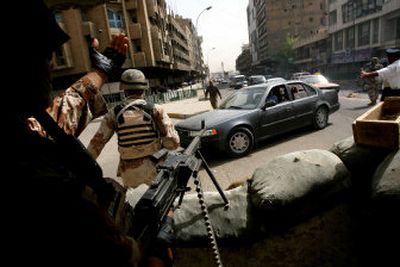Gas sickens soldiers in Iraq

BAGHDAD – A car bomb attack outside a major U.S. military base in Iraq discharged a gaseous cloud that sickened dozens of people Sunday, punctuating a flurry of violence that left 14 American soldiers dead over the past three days.
The bomb exploded near the main gate of Forward Operating Base Warhorse, the largest U.S. military facility in Diyala province, a restive territory north of Baghdad. An Iraqi employee on the base said the bomb unleashed chlorine gas. The U.S. military cited an “unconfirmed report of off-color smoke” that caused soldiers to complain of “minor respiratory irritations and watery eyes,” according to a statement. Soldiers were rushed to the clinic on base for treatment, but there were no deaths.
“Something made them feel ill,” said Lt. Col. Christopher Garver, a U.S. military spokesman in Baghdad. “What it is specifically, we haven’t figured that out yet.”
Chlorine gas has become a regular weapon in the Sunni insurgent arsenal but has rarely been used against large numbers of American soldiers.
About 3,000 additional U.S. soldiers were recently deployed to Diyala to battle a complex mesh of Sunni and Shiite militant groups, and the American death toll there has risen steadily in recent weeks. Earlier Sunday in Diyala, a car bomb exploded as an Iraqi police patrol transported prisoners to a station in Balad Ruz, killing 15 people, including 11 police officers, and wounding 35, according to Lt. Mohammed Hakman, of the provincial police.
On Sunday, the U.S. military announced that a series of other bombings and shootings, most of them in and around Baghdad, took the lives of 14 soldiers and wounded 24 since Friday. May was the third-deadliest month for American troops in Iraq since the 2003 invasion, and the casualties in the past few days indicate the insurgency shows no sign of abating.
“This is going to get harder before it gets easier. We’re fighting a determined, adaptive enemy that’s trying to derail the security plan and kill as many American soldiers as it can,” Garver said. “This is how we’re going to get to long-term security, through this short-term upswing in contact with the enemy.”
U.S. military officials cite many reasons for the recent rise in fatalities, including the growing use of deeply buried, powerful roadside bombs that can blast through armored vehicles and the more aggressive tactics of American troops who are patrolling in greater numbers in unexplored areas. The counterinsurgency strategy launched by Army Gen. David Petraeus, the top U.S. commander in Iraq, has moved soldiers off the sprawling, fortified American bases into smaller, more vulnerable outposts in violent neighborhoods to bring them in more sustained contact with the people they want to protect. But their presence creates more potential targets, as combat operations have expanded with the addition of five brigades of soldiers in Iraq, part of President Bush’s troop buildup.
Most of the U.S. casualties since Friday resulted from roadside bombings, the deadliest weapon Americans face in Iraq. A roadside bomb northwest of Baghdad killed four soldiers on patrol Sunday, and two more soldiers were killed Saturday by a roadside bomb in Nineveh province, north of Baghdad. In a series of other attacks, two soldiers were killed in Diyala province and six in the Baghdad area. In one incident, a soldier on foot patrol southwest of Baghdad spotted two men near a mosque who appeared suspicious, the military said. As the soldier approached to question them, one of the men detonated explosives, killing himself and the soldier.
The soldiers’ names were withheld pending notification of their families.
In Baghdad early Sunday morning, Iraqi special operations troops exchanged gunfire with insurgents while the troops were raiding a government building in the capital in search of a senior militia leader believed responsible for coordinating kidnappings and roadside bomb attacks, the U.S. military said in a statement. The military did not identify the government building or the suspected militia leader.
The U.S. military also reported that Marines, working with Iraqi soldiers and police in the western city of Fallujah, killed seven suspected members of the insurgent group al-Qaida in Iraq, detained eight others and destroyed a truck bomb factory Saturday.
Iraqi police patrols in the capital found at least 21 bodies, the victims of apparent sectarian killings.